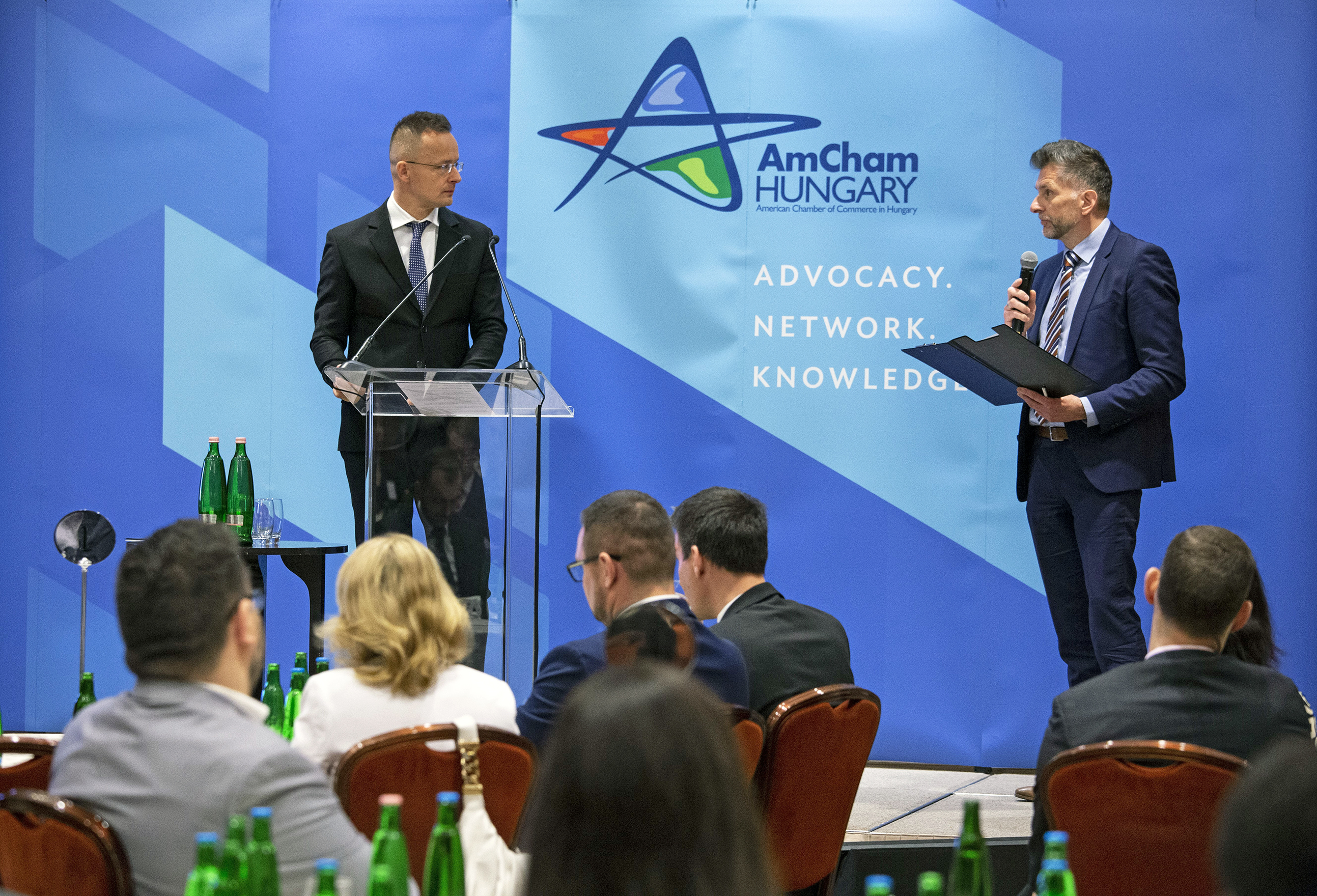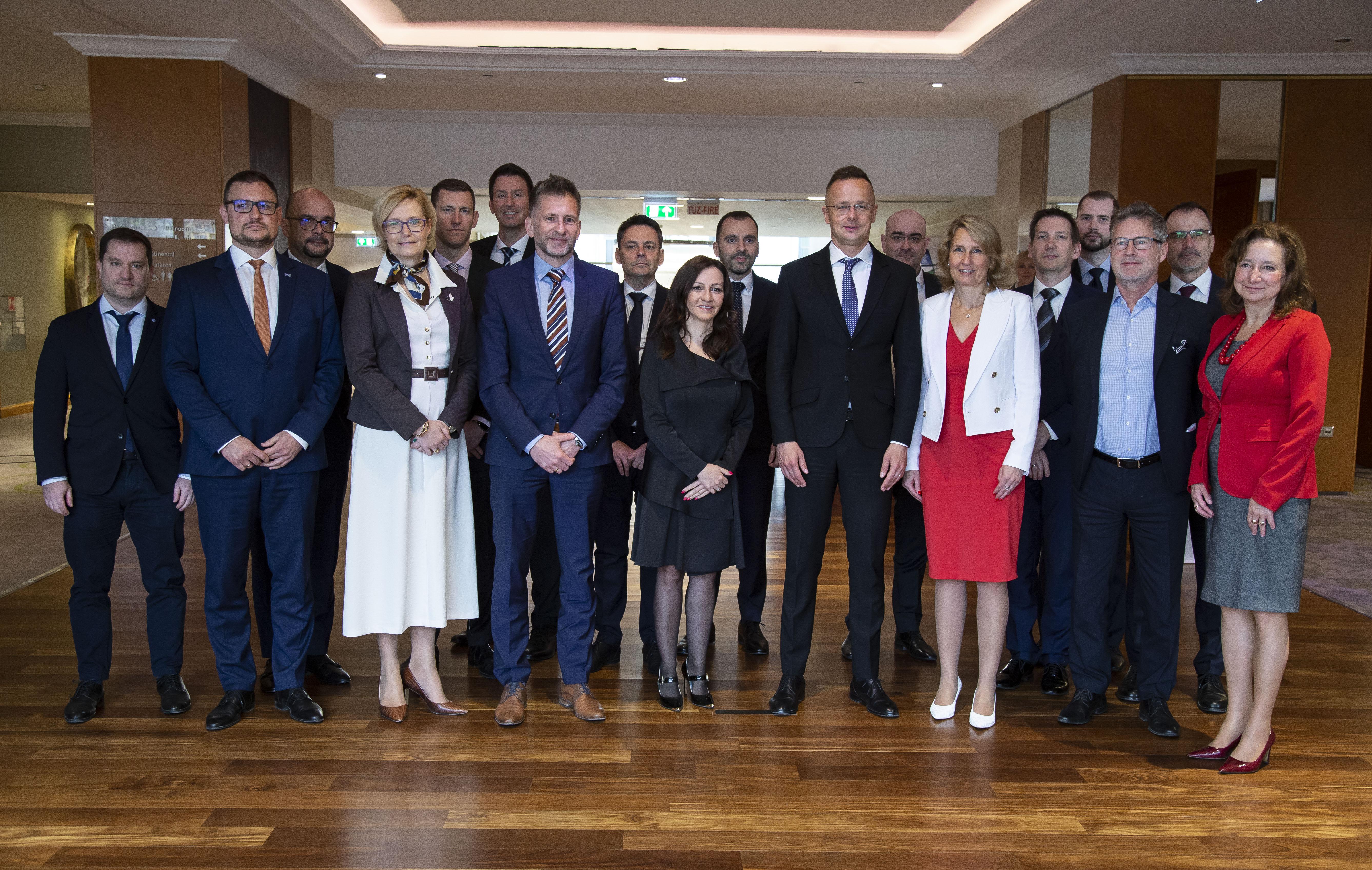Szijjártó: Keeping Hungary a Meeting Point of Western and Eastern FDI is key to Growth
.jpg)
Minister of Foreign Affairs and Trade Péter Szijjártó addresses AmCham members.
Photo by Lázár Todoroff / AmCham
Hungary wishes to keep its doors open to investors regardless of origin as only steady foreign direct investment inflow can pave the way to sustainable development, Minister of Foreign Affairs and Trade Péter Szijjártó told members of the American Chamber of Commerce (AmCham) in Hungary.
Attendees of the business forum at the InterContinental Budapest Hotel on April 3 were first given a summary of the economic consequences of the war between Ukraine and Russia. The minister pointed out that, although it is a regional conflict, the price was being paid by the entire continent in the form of inflation, surging energy prices and commodity shortages.
Most of all, European competitiveness suffers. In Europe, natural gas costs seven times more than in the United States, and electricity is three times higher than in China. According to the minister, sanctions continue to strain the European economy but have failed to force Russia to cease its aggression and have not prevented the financing of the war, he insisted.
Intensifying weapons deliveries, a race Szijjártó said was initiated by America, does not help end the conflict. Hungary has been advocating peace from the outset, not least because many ethnic Hungarians in Ukraine have died in the war. The minister insisted that Hungary belongs to the majority of countries in the world that don’t provide military support to Ukraine, but added that he worries continued war will lead to a globe divided into blocs.
“History taught us that when there was a conflict between East and West, we always lost. Therefore, instead of creating blocs, we urge for connectivity and mutual respect,” Szijjártó said. He added that, unfortunately, he sees signs of “decoupling” globally, with attempts to cut economic ties between the EU and China.
“If this happens, this would be a knock-out,” he said, referring to the bilateral trade volume of EUR 875 billion between the two geopolitical superpowers.
Whatever may come geopolitically, the automotive transition is inevitable and provides a massive opportunity for Hungary. As the minister highlighted, European OEMs drew up great business plans for handling the jump to electrification but didn’t factor in that the top 10 battery manufacturers are Chinese and Korean companies.

Minister of Foreign Affairs and Trade Péter Szijjártó and AmCham President Zoltán Szabó conduct a Q&A session.
East Meets West
This is where Hungary comes into the picture. The country has never discriminated against investors, the only precondition being the requirement to respect local regulations. Many Western investors have been asking the government to lay the groundwork for greater Eastern capital influx to shorten supply chains, the minister noted.
“We wish to remain the meeting point for Western and Eastern investors because that is the key for long-term growth and our protection against all uncertainties,” Szijjártó said, noting that Hungary is making itself an essential element of the electrification of the automotive industry.
The country is the fourth largest battery producer in the world, three of the seven biggest battery manufacturers are present here, and Hungary is the only country outside of Germany and China where the top three premium German automakers (Audi, BMW, and Mercedes) have a manufacturing presence.
In 20 of the last 25 months, batteries were Hungary’s top export item, contributing to last year’s all-time export record of EUR 142 bln. Battery-related economic activities also helped exceed the HUF 10 trillion threshold for the first time in automotive and electronics in 2022, the minister said
The government has a clear strategy built on four pillars to keep the economy on a growth track. Firstly, it will continue to support export activities by all means, whether economic, political or financial. In addition, it is necessary to help Hungarian companies invest abroad. Many local exporting businesses have reached a glass ceiling, and without setting up shop across the border, won’t be able to accelerate their export volumes.
Secondly, the government will mobilize all its assets to increase FDI attractiveness, as it is a significant factor for economic development. Up to 1,700 U.S. companies employing some 107,000 people operate in the country, 14 of which have a strategic partnership agreement with the government. Bilateral trade hit a record high last year, and in the past eight years, 103 U.S.-related deals have been incentivized, with another eight new FDI projects in the pipeline.
‘Keep Relationship Alive’
“We count on American businesses to keep this close relationship alive given the current political relations,” Szijjártó noted for the third pillar, in reference to the fact that Hungary’s conservative government tends to have better relations with Republican administrations.
He listed energy security as the fourth leg of Hungary’s long-term economic strategy. Hungary won’t give up any existing reliable sources, and diversification means adding additional energy sources. That includes 100 million cubic meters per year of natural gas from Azerbaijan, starting at the end of 2023; under a long-term contract, that will rise to two billion cubic meters.
Ongoing talks with southeastern countries could make more Azeri gas and LNG from Greece and Turkey accessible to the CEE region. The expanded nuclear power plant in Paks is scheduled to be in operation by 2030 or 2031, providing ultimate energy security for the economy.
“We are living a nuclear renaissance, led by France,” Szijjártó noted.
Many AmCham members had been concerned by the termination of the double taxation treaty between Hungary and the United States. The minister said that Hungary had given up its veto of the global minimum tax, which was the reason cited for the termination; therefore, the Hungarian Government sees no obstacle to beginning negotiations on a new treaty. However, the minister argued this would only happen under a Republican administration.
Regarding labor shortages, Szijjártó stressed the importance of maintaining the FDI inflow, as new jobs are needed to secure existing ones. There is a clear methodology under what conditions guest workers can be employed while ensuring that all Hungarians have a job. Domestic mobility must be further encouraged by housing and commuting incentives, but long-term growth is ultimately connected to maintaining foreign capital influx.
AmCham President Zoltán Szabó said the chamber appreciated the minister’s openness to consultations with businesses. Regarding the U.S-Hungarian Double Taxation Treaty, AmCham is currently working to assess the short- and long-term impacts of the treaty’s cancellation and to facilitate dialogue between decision-makers. However, the chamber is concerned that negotiating a new treaty could take years. A newly formed task force of the AmCham Tax Committee is dedicated to clarifying emerging questions and uncertainties and finding possible solutions from the business side to the challenges that arise from the cancellation.

Prior to the business forum, Minister of Foreign Affairs and Trade Péter Szijjártó met privately with members of the AmCham leadership team.
This article was first published in the Budapest Business Journal print issue of April 21, 2023.
SUPPORT THE BUDAPEST BUSINESS JOURNAL
Producing journalism that is worthy of the name is a costly business. For 27 years, the publishers, editors and reporters of the Budapest Business Journal have striven to bring you business news that works, information that you can trust, that is factual, accurate and presented without fear or favor.
Newspaper organizations across the globe have struggled to find a business model that allows them to continue to excel, without compromising their ability to perform. Most recently, some have experimented with the idea of involving their most important stakeholders, their readers.
We would like to offer that same opportunity to our readers. We would like to invite you to help us deliver the quality business journalism you require. Hit our Support the BBJ button and you can choose the how much and how often you send us your contributions.








